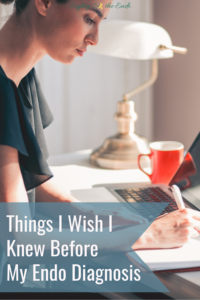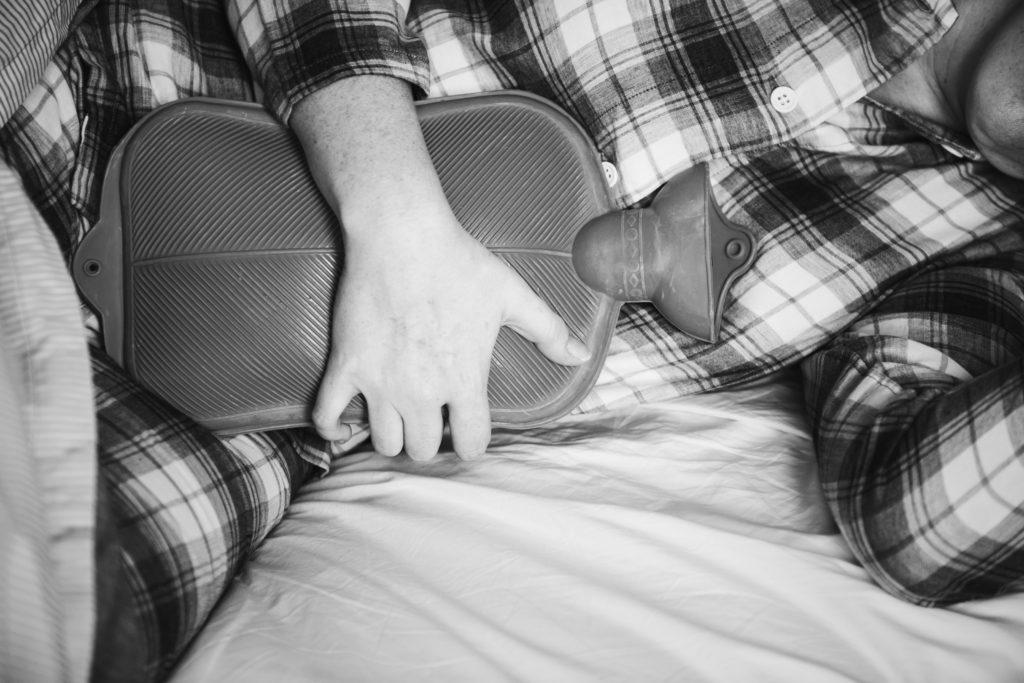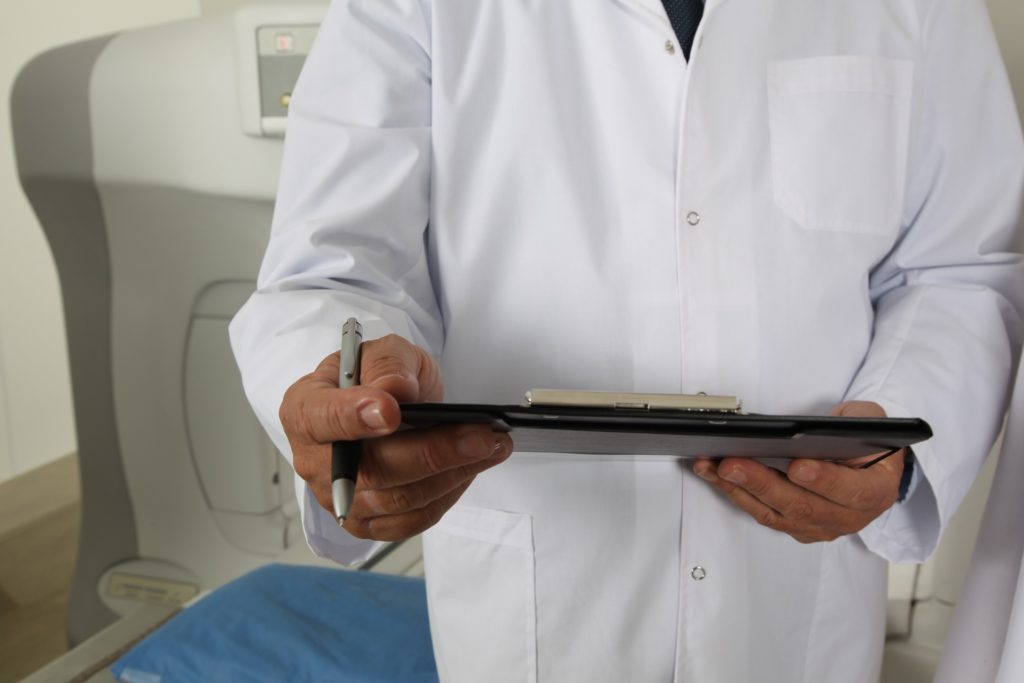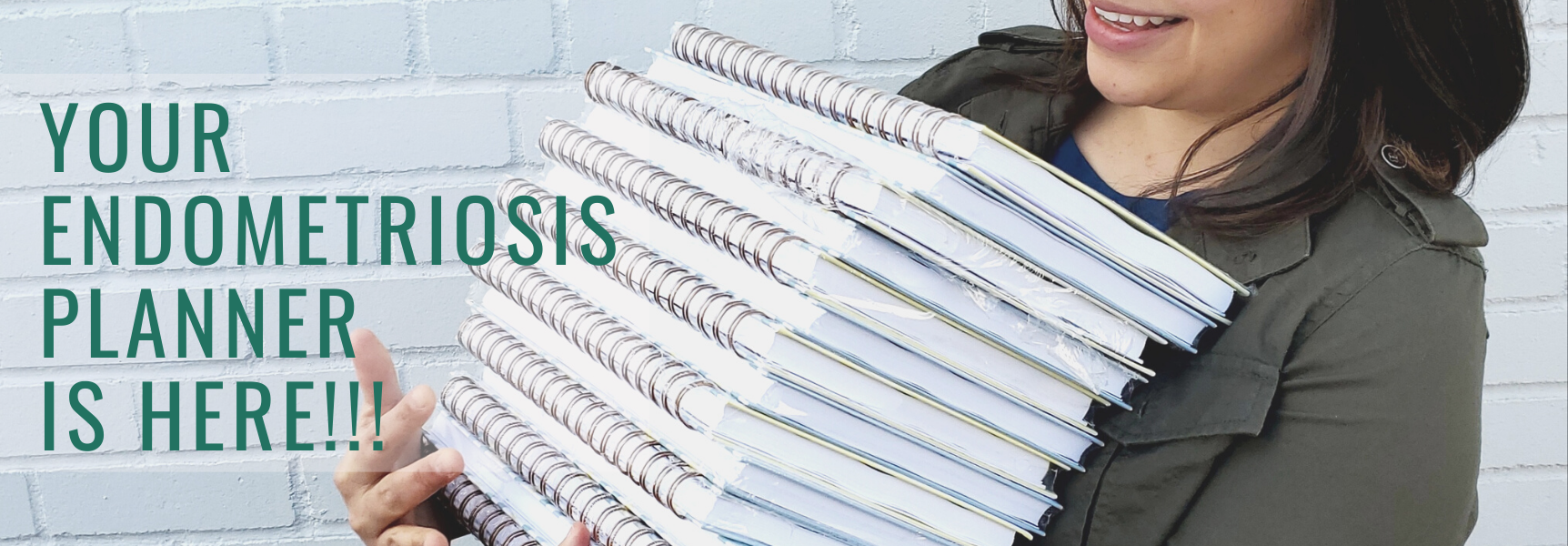November of 2017 was when I finally had been given my endometriosis diagnosis. It confirmed why I had struggled with horrible periods since my adolescence. Every day since my surgery, I have questioned everything that led up to my delayed diagnosis. What could I have done differently? How could I have known sooner? Basically, there are countless encounters that have led up to this list of things I wish I knew before my endo diagnosis.
Because the fact of the matter is, mostly everyone who gets diagnosed never had a clue as to what was causing their symptoms. Even that, their diagnosis is usually delayed for an average of 8-15 years after the onset of symptoms. Most women, me included, are taught the pain is normal. We’re taught to deal with it. Or our mentation is questioned by our physicians who start to believe it’s all in our heads.
Why Don’t We Know More Before Our Endo Diagnosis?
 It’s downright upsetting. And having worked in healthcare for 6 years now, I see where the faults lie. For one, physicians and nurses don’t get thorough education in regards to women’s health issues. Basically, anything outside of normal menstruation and pregnancy gets left behind for practitioners to learn once they specialize. But even then, they are being misinformed and it keeps being passed from one generation of doctors to the next.
It’s downright upsetting. And having worked in healthcare for 6 years now, I see where the faults lie. For one, physicians and nurses don’t get thorough education in regards to women’s health issues. Basically, anything outside of normal menstruation and pregnancy gets left behind for practitioners to learn once they specialize. But even then, they are being misinformed and it keeps being passed from one generation of doctors to the next.
Endo warriors are fighting a losing battle and are being gas-lighted constantly. . . unless they get care from a true endometriosis expert.
But even those are far and few in between (join Nancy’s Nook Here to gain access to a list of experts in the field). Needless to say, we are struggling and things need to change!
But where to start?
At this point, I have lived with endo for over 15 years and have only had a diagnosis for two years. But even leading up to my diagnostic surgery, I had no idea what I was getting into, what was to come, and what I could’ve done to help my overall outcome.
So, today I am sharing the few things I wish I knew before agreeing to go under the knife.

Painful periods are not normal.
Although this dates back to well past my surgery, I feel it’s absolutely worth mentioning. Had I known that my symptoms were not normal, I truly believe I would have been able to avoid a lot of the pain and heartache I’ve felt over the years. I even might have avoided my current struggle with infertility.
To be clear- If you or anyone you know has painful and debilitating periods (no matter their age or gender), then seek out care from your provider. Also, if your physician does not think that you have endometriosis, but you have done your research and disagree, then seek out the opinion of an endo expert.

Anyone can say they are an endometriosis specialist.
Just before being diagnosed, my ob-gyn was highly suspicious of me having endometriosis. So, of course, she recommended that I have laparoscopic surgery and she said she would remove any endo if she saw it.
Not knowing much about endo and treatment options, I believed her and thought that I would be rid of any endo after surgery. To put it frankly, I thought that I would no longer have endo; something that I now know is impossible, since there is no definitive cure.
Unfortunately, the method she was taught (ablation) is known for causing more damage than good.
Because of my ablation surgery, just 2 months after my surgery, my pain was back and worse than ever. However, back then I didn’t believe my pain was due to my surgery. I assumed it was due to food sensitivities or a developed autoimmune disease.
But why did I assume this?
Because after my surgery, I moved and my new ob-gyn told me that it was unlikely the pain was coming from my endo. He did not say it was impossible, but him saying it was unlikely made me believe that it was not associated with the type of surgery I had.
I even remember asking him about the ablation wording I saw in the surgical note. He stated it was an effective method sometimes. But his tone and response gave me the impression that my surgery was not the cause of my worsening symptoms.
He then recommended an elimination diet and tons of supplements to alleviate my symptoms and improve my chance of conceiving (we were trying to conceive back then). To be clear, I appreciated and still appreciate his holistic approach.
But now, I see that my pain is from my endo and the type of surgery I underwent. The foods that I eliminated were only exacerbating the inflammation and symptoms (well that, and the fact that I am actually intolerant to gluten, dairy, and pork).
Basically, what I’ve learned is that anyone can call themselves an endo specialist. And while they may know a lot about endometriosis, they still might not be the best person to do your surgery. Because the truth is, if your ob-gyn is primarily treating patients who are pregnant or trying to conceive, then they likely aren’t getting the amount of surgical experience needed to become experts in Laparoscopic Excision Surgery.

I wish I would’ve known to look for an endo expert who does excision of endometriosis.
Laparaoscopic excision (LAPEX) is the gold standard in treatment options for endometriosis. Excision and ablation are two different methods of removing endometriosis. Both are usually done via laparoscopic surgery.
However, excision is the gold standard method because it involves cutting the endo lesions down to the root and even past the root (to avoid cells being left behind). Ablation, on the other hand, usually uses laser technology or electrical currents to zap the surface of the endometriosis lesions. This can lead to deeper cells being left behind and the development of worsening scar tissue.
Had I known that my options surpassed what my doctor was offering, I know I would’ve held off on surgery and spent all that money on expert deep-excision with another physician. You can read more about why surgical method matters here.

It’s Up to You
Basically, everything I wish I knew before I was diagnosed with endo comes down to being misinformed and not doing my own research before going in for surgery.
Which is why I am now such a huge advocate for all my readers, followers, and patients. Ya’ll, do everything you can to research and learn all that there is to know about endo. This will give you the confidence to advocate for yourself and the best possible care.




